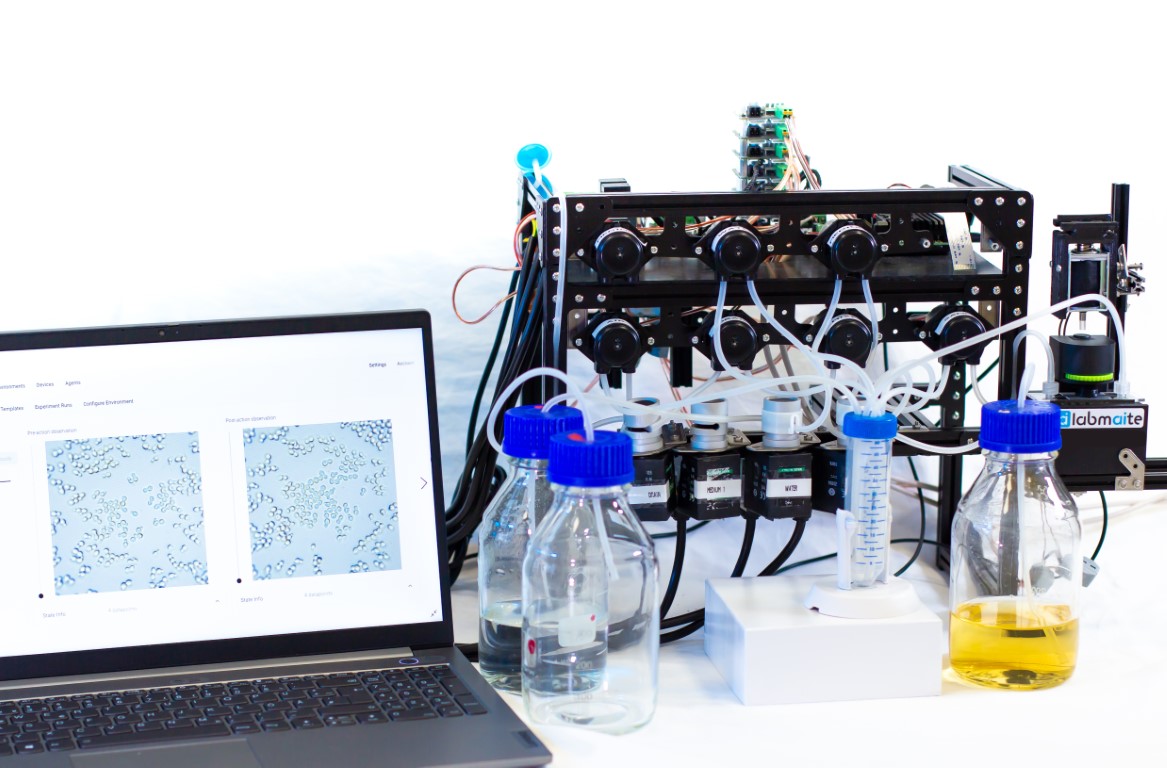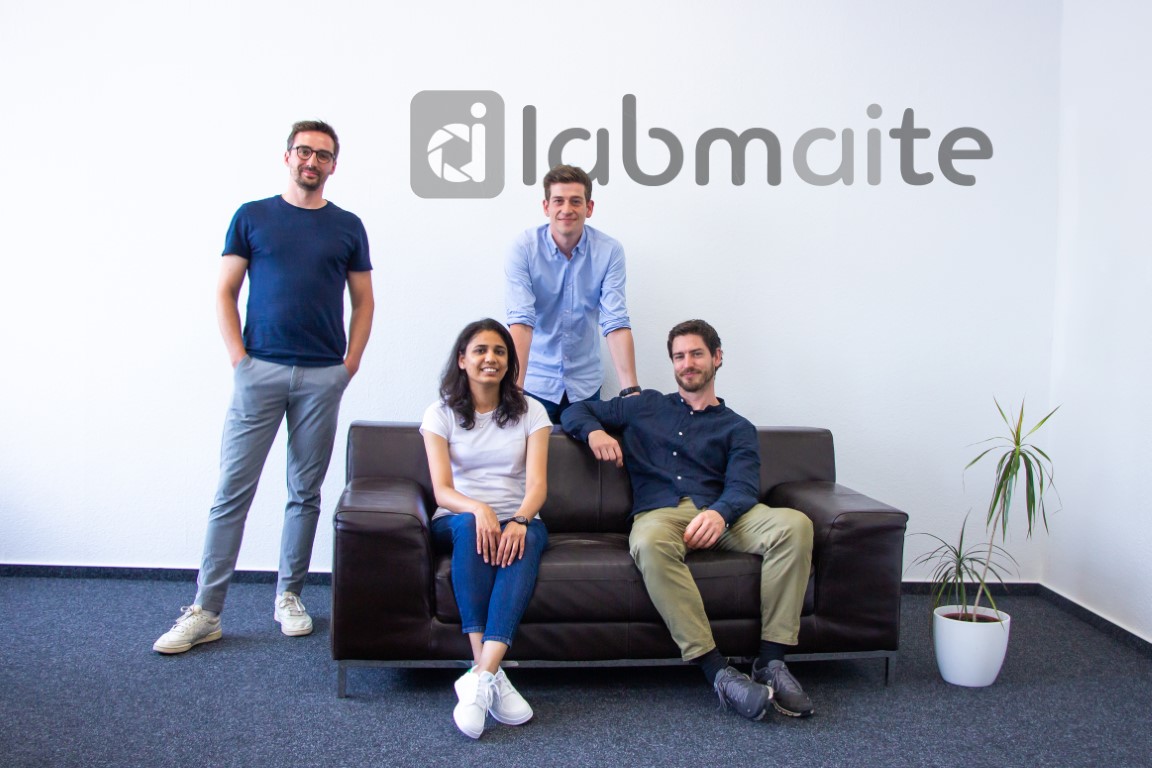Laboratory automation
Reaching the goal quickly and efficiently with the help of artificial intelligence
Medical research is slow, costly and time-consuming. The system developed by the start-up LABMaiTE could soon change that. With the help of artificial intelligence, it will be possible to automate laboratory experiments and collect and analyse data at the same time.
Conventional research, as conducted for centuries in laboratories around the world, is very laborious and time-consuming. Researchers try to identify and optimise various parameters that determine whether an experiment is successful. This is an almost impossible task when you consider how many parameters can influence a result. Humans can keep an eye on a maximum of two to three parameters, whereas artificial intelligence (AI) can optimise more than 20 dimensions simultaneously.
Experiments become faster, more efficient and less expensive with AI
The young Freiburg-based company LABMaiTE is taking advantage of this. The system follows the same principle of trial and error as human researchers: researchers define the desired outcome of the experiment, and AI carries out trials and makes adjustments until optimal conditions are achieved.
"We want to enhance laboratory automation with artificial intelligence so that research can be more targeted," explains LABMaiTE co-founder Jonas Bermeitinger. Human-induced variability can thus be eliminated, generating time and cost savings. This technology has the potential to accelerate medical research, as well as product, media and cell line development.
While AI continually adjusts the experimental conditions to arrive at the desired outcome, experimental data is being collected and analysed simultaneously. This eliminates the time-consuming aspect of subsequent data analysis. The recently founded company provides both the hardware and the software needed to conduct experiments as well as collect and analyse the data.
 LABMaiTE's system enables fast, efficient and cost-effective experimentation with the help of AI. In addition, data is collected and analysed directly during the experiment. © LABMaiTE
LABMaiTE's system enables fast, efficient and cost-effective experimentation with the help of AI. In addition, data is collected and analysed directly during the experiment. © LABMaiTEThe idea is that this will change the way researchers work, as automation will make it possible to generate more results in less time. AI will find a traceable and understandable way to reach a goal without researchers having to look for it themselves.
In general, microscope images (described by Bermeitinger as "unused treasures") are a source of information for experiments with cell lines. These images contain much more information about a cell than humans are able to process. AI could make much better use of this potential, drawing conclusions from it and connect these conclusions with each other.
LABMaiTE has already filed two patent applications for its system. One patent has been granted in Germany and the international application is pending.
Possible applications in cancer therapy
The LABMaiTE system has a broad range of applications. It can be used in almost any laboratory, for example in research into leukaemia treatment options. Every year, about 120,000 patients are diagnosed with a type of blood cancer (or so-called liquid tumor) such as leukaemia. A promising but expensive treatment method known as the CAR T-cell therapy is already available. It works by isolating the patient's own immune cells and genetically modifying them so they attack the cancer cells in the body more efficiently.1) However, cultivating the cells in the laboratory is a challenge as the growth conditions need to be adapted to individual patients. Finding the optimal growth conditions is time-consuming and costly, because each cell is a complex system that reacts to environmental stimuli and interacts with its surroundings. But exactly how this happens is invisible to the human eye. This is where AI is supposed to act as a translator, so to speak, between cellular intelligence and human intelligence. In so doing, it works directly with the patients' cells. "Other AI applications are often model-based. We, on the other hand, want to train our AI directly on the real experiment and thus bypass the in silico model," explains Bermeitinger.
Young dynamic team of founders with expert support
 LABMaiTE founders: Roman Melachrinos, Avani Sapre, Dennis Raith and Jonas Bermeitinger (from left to right) © LABMaiTE
LABMaiTE founders: Roman Melachrinos, Avani Sapre, Dennis Raith and Jonas Bermeitinger (from left to right) © LABMaiTEThe idea for the project came from Prof. Dr. Roland Mertelsmann, an oncology expert at the Freiburg University Medical Centre. LABMaiTE CEO Jonas Bermeitinger spotted the potential and wanted to put the idea into action. Bermeitinger studied aerospace engineering and came to automation in special machine construction and finally to laboratory automation through a series of other projects and coincidences. The team has been supported by EXIST funding since March 2021, and Bermeitinger founded LABMaiTE GmbH in November 2021 together with Dennis Raith (CTO), Avani Sapre (Research and Development) and Roman Melachrinos (Marketing and Sales).
The name 'LABMaiTE' comes from the words 'lab' – an abbreviation for laboratory – and 'mate' – the English word for friend. LABMaiTE is therefore a lab technician’s or lab assistant’s friend, with help from AI (artificial intelligence).
The young and committed founding team is demonstrating how important it is to combine different disciplines in science. This is the only way to come up with innovations and advance medical research and development.